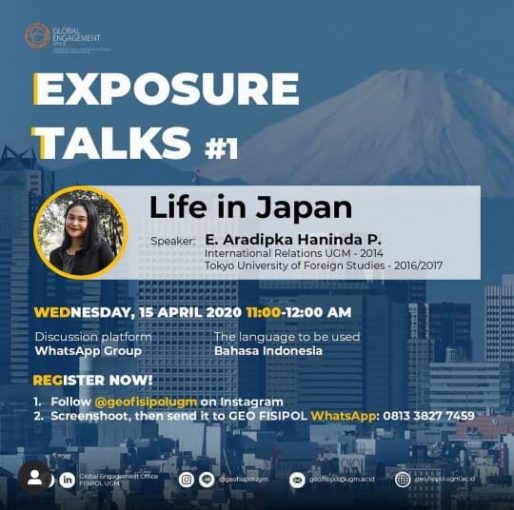
Yogyakarta, April 15th 2020—Exposure Talks is a digital discussion held by the Global Engagement Office (GEO) of Gadjah Mada University’s Faculty of Social and Political Science. Exposure Talk aims to open a dialog about student exchange and international exposure. The first Exposure Talks meeting was titled “Life in Japan” with E. Aradipka Haninda P. or Dipka as the speaker. Dipka is an alumni of International Relations study that did an exchange program to Japan, specifically at Tokyo University of Foreign Studies (TUFS) for a year.
This discussion was moderated by Raissa Almira or Raissa as a staff of GEO. The discussion was opened by a short introduction of the speakers and the rules of the discussion. For starters, Raissa asked the audience what kind of questions does the audience wants to ask about studying in Japan. Before explaining the answers, Dipka explained the first steps of student exchange which are the application process and settling in.
Dipka elaborated that there are several steps that needs to be done during the application process which are checking the webpage of the international affairs office, getting all the necessary documents prepared, and receiving the Letter of Acceptance. The first webpage to go to is the Office of International Affair’s to see which university are cooperating with the home university. That webpage will also show the deadline and documents that needs to be fulfilled. There are several administrative files that will be asked such as score transcript, recommendation letter, and IELTS/TOEFL. The span of time between the application process and getting the Letter of Acceptance usually takes two to three months. Dipka said that she applied in April and got accepted in June. After that, Dipka directly made her visa and flew to Japan on the end of August.
After leaving, the next step that needs to be done is to settle in. What student needs to do are to learn a bit of the local language, communicate with the assigned buddy, follow the student orientation, mingle with other people, and join the campus events. If people choose their student exchange in Japan, it will be a good idea to learn Japanese language before leaving or at least some survival Japanese, Dipka said. In Japan, the university students and other students speak little to no English, especially in stores or the train station. Dipka also said that TUFS assigned the buddies before the exchange student arrive in Japan. Usually, TUFS will allocate a buddy that is learning or able to speak the local language of the exchange student.
The education system in TUFS is similar to that in Gadjah Mada University’s meaning that both use the university credit unit. The exchange student can also take RyuuGakusei if they already master N3/N2 JLPT (Japanese Language Proficiency Test). Despite that fact, the English classes is numerous though it has a smaller capacity and a more specific material. There are three departments in TUFS: School of Language and Cultural Studies, School of Japan Studies, and School of International and Area Studies. Exchange students can take any class in any department. Dipka took the majority of her class from the School of International and Area Studies because she is a student of International Relation. Before going to the next topic, Dipka answered a question that was asked earlier in the session.
The discussion was followed by a talk about what life in Japan is like. It covers information from living cost, tourist destination, and the culture. Dipka said that the living cost per month is around 80.000-12.000 yen that covers the cost of living in the campus dorm, cost of food, and transport if students want to stroll around the center of the city. Of course, the living cost will be lower if students cook their own food, get the JASSO scholarship, and work part time. About the tourist destination, Dipka recommended many places to visit and activities to do in Tokyo such as going to Shibuya Crossing and seeing the Hachiko statue, Takeshita Street, Tokyo Disneyland and Disneysea, Akihabara, Kamakura, Shinjuku Goen or Inokasihara Park, Shimokitazawa, and many more.
Dipka also said that in TUFS there was an event called “Gaigosai” or the Borderless event held every November. The Japanese university student from every language study will open a booth to present some food and cultural facts about the nation where their language comes from. There will also be dances, movie screening, and games. Gaigosai in TUFS is one of the most popular in Japan so that university students from all across Tokyo and other cities will come. There is also no classes for a week so that students can prepare for Gaigosai.
The discussion was closed with a question and answer session. Dipka answered each question effortlessly and in detail. The event was closed on 12.06. Though the event has already finished, Raissa and Dipka still allows the audience to ask them any question through Dipka’s email or GEO’s official Instagram.
